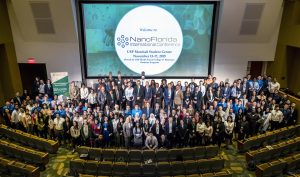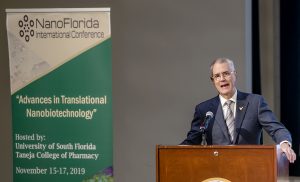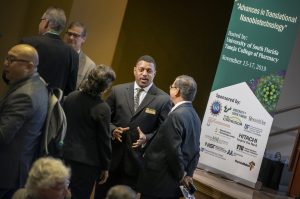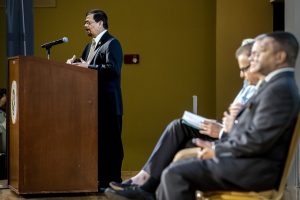USF recently held a big meeting about exploring the very small.
In November, the USF Health Taneja College of Pharmacy hosted the 12th annual NanoFlorida International Conference on the USF campus. The three-day conference, which included keynote addresses by USF President Steven Currall and Tampa Mayor Jane Castor, was centered around future developments in the field of nanotechnology.

Participants pose for a group photo during the NanoFlorida International Conference.
“Nanotechnology is to work in the smallest scale possible, called nanoscale,” explained USF Health professor Shyam Mohapatra, PhD, director of the Center for Education and Research in Nanobioengineering and conference chair of the International Academy of Nanotechnology.
For comparison, one nanometer is one-millionth the diameter of single strand of human hair, Dr. Mohapatra said.

USF President Steven Currall gave a keynote address during the NanoFlorida International Conference in the Marshall Center on USF campus.
Nanotechnology is being studied in a wide range of sciences, including chemistry, engineering and medicine. The technology is already being used in many industries and products people use every day. For example, nanotechnology has helped reduce the size of cell phones from the unwieldy devices of yesteryear to the advanced computers that now fit in your pocket.
But it’s not just consumer goods where nanotechnology is making a difference. USF Health Taneja College of Pharmacy is looking at how the technology can help better deliver medication to patients.
“The whole notion of pharmaceutical nanotechnology is to take a molecule and make it even smaller so we can deliver (medicines) into parts of the body that normally we can’t get into,” said Kevin Sneed, PharmD, FNAP, FNPHA. Dr. Sneed is senior associate vice president, USF Health and dean of the USF Health Taneja College of Pharmacy.

Kevin Sneed, PharmD, FNAP, FNPHA, talks to dignitaries during the NanoFlorida International Conference. Dr. Sneed is senior associate vice president, USF Health and dean of the USF Health Taneja College of Pharmacy.
For instance, researchers are studying how nanotechnology can assist the treatment of brain cancers and brain disorders.
“Lots of medications cannot get into the brain when taken orally or otherwise,” Dr. Sneed said, “By making them smaller, now we can transport them into the brain.”
The Taneja College of Pharmacy is embracing pharmaceutical nanotechnology by offering a master’s in science degree in pharmaceutical nanotechnology – the first such degree in the state of Florida.
“We had an opportunity to build a pharmaceutical or drug delivery program,” Dr. Sneed said. “Nanotechnology was very futuristic, and we wanted to be a very futuristic, very innovative, very transformative pharmacy program.”
About 50 students are currently enrolled in the pharmaceutical nanotechnology degree program.

Shyam Mohapatra, Distinguished USF Health Professor, Director of Center for Education and Research in Nanobioengineering in the Morsani College of Medicine and Associate Dean Graduate Program in the Tanjea College of Pharmacy and Conference Chair of the International Academy of Nanotechnology, opens the NanoFlorida International Conference.
During the NanoFlorida International Conference, participants attended a number of plenary sessions discussing advances in nanotechnology and its use, and students from USF and other major colleges presented 138 research posters for judging.

Sonali Kannaujia (left) and Liguan Li, a graduate student and a PhD candidate both studying electrical engineering, look at their poster presentation before the start of judging during the NanoFlorida International Conference. The USF students created a Wireless Interrogated MEMS Capacitive Intraocular Pressure Sensors to help with the treatment of Glaucoma.
The NanoFlorida International Conference is organized by the Florida Association for Nanotechnology, a society composed of basic and translational nano-bio technologists who use a variety of nanoscale sciences and technologies to better understand the way the nano-bio systems function.
Video, photos and article by Allison Long, USF Health Communications & Marketing
